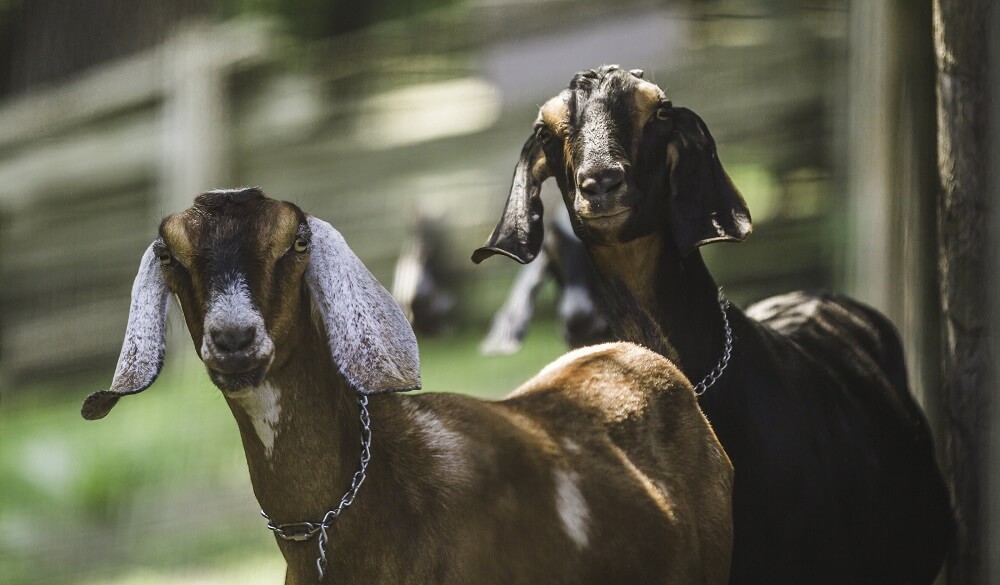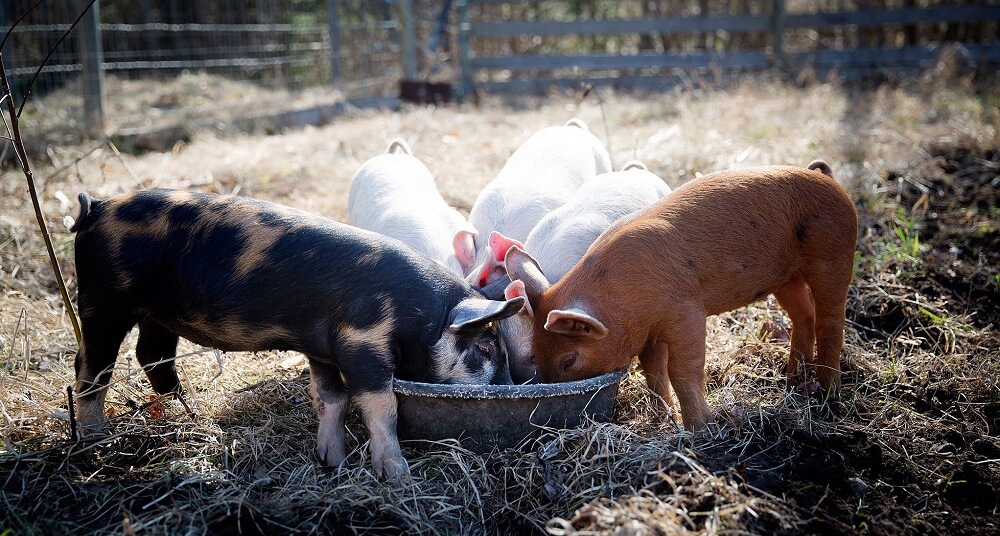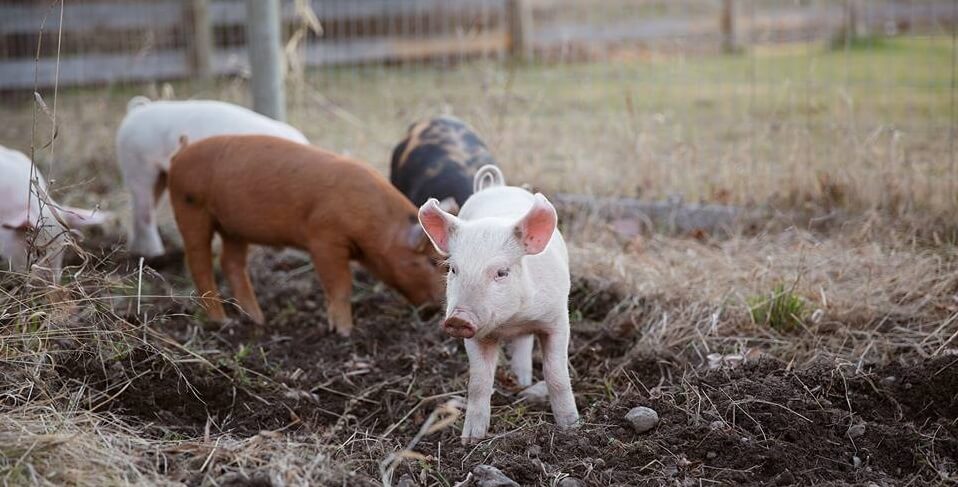
Goats and pigs have some similarities in that they both live on farms. But they also have a lot of differences, such as living requirements and their display of social behaviors. They can both get a little wild sometimes.
Can goats and pigs live together? Goats and pigs can live together, but there are a lot of risks with very little benefits. These two animals don’t always live in harmony. Pigs can be aggressive to goats and, in some cases, have been known to eat baby goats.
You don’t often see many other animals mixed into a pigpen. This is because pigs can be very territorial and aggressive. There are few benefits to putting goats and pigs together in the same living space. Let’s see if we can find any.
Can Pigs And Goats Live Together?
Pigs and goats can live together; however, you should keep these considerations in mind for both animals’ safety and well-being. Pigs and goats can both become territorial (especially from the nannies) which can lead to fighting.
Pigs and goats have different dietary requirements (goats are herbivores, pigs are omnivores) and different temperaments. Pigs are also larger than goats, and goats have horns which can lead to injuries. Pigs have different basic needs than the needs goats have to be healthy.
Can Goats and KuneKune Pigs Live Together
Goats and KuneKune pigs can live together. In fact, out of all pig breeds, the KuneKune pig has the most peaceful temperament and enjoys interacting with other animals, such as chickens, cows, and ducks. It’s important to mention that KuneKune pigs are mischievous, so they may irritate your goats at some point, which usually ends with the pig being headbutted by the goat.
This breed of pig is on the smaller side of the scale (weighs between 120 and 240 pounds and has a length of around 30 inches), which means they aren’t as intimidating as other breeds. Another great trait of the KuneKune pig breed is unlike breeds such as the Berkshire pig, which is very destructive, the KuneKune breed doesn’t root in the dirt, thanks to their upturned snouts.
Can Mini Pigs Be Safe With Goats?
Mini pigs can live with goats. However, it’s essential to remember that these tiny pigs sometimes have big attitudes. Due to their small size, they tend to be more aggressive, so they aren’t pushed around. Be wary of introducing baby goats to mini pigs, as the pigs may feel threatened by them and display aggression.
Can Potbelly Pigs And Goats Live Together?
Potbelly pigs and goats can live together. However, it’s important to note that most potbellied pigs suffer from obesity, which means they like to eat anything. Ensure the goats have a separate feeding area, as the potbelly pigs will fight to eat as much of the goat’s feed as possible. While these pigs are generally a friendly breed, they have moments where they become aggressive toward other livestock, especially if they feel threatened or territorial. It’s best to sterilize the pig to help curb their aggression.
Pigs Like Other Pigs
Pigs like being together with other pigs. In fact, they tend to need the company of other pigs. But they don’t always do well with other farm animals in their space.
They have been known to eat chickens who enter their pen.
Remember that pigs are omnivores and will eat meat as well as vegetation.
If a pig sizes up another creature and determines it’s weaker than itself, it may just decide to show the other animal who is boss. They will let their dominance be known. They can injure or kill other, smaller animals.
Pigs are known to do best when housed with their own kind. A pig can, and might, eat a goat housed with it.
The only way cohabitation may work well between a pig, and a goat is if several different kinds of animals, such as cows, goats, pigs, and sheep are all sharing the same pasture and raised together. Different social habits can be established if pigs aren’t the biggest animal in the space.
Goats Like Almost Anybody
If it were up to the goat, everyone would get along. Goats can peacefully roam in the pasture with any number of farm animals: horses, cows, sheep, you name it. Goats are social and friendly. But they’ll also eat other animals’ food. Which can cause its own set of problems, if there isn’t enough food to go around.
If given enough space and resources, a goat will do its own thing and maintain a simple existence among other peaceable creatures. You’d never house them with a predator, of course. Wolves, dogs, or foxes should never be allowed with other animals, anyway.
Problems With Pigs And Goats Sharing Space: Different Strokes for Different Folks
Pigs and goats live differently. They need different foods and have different habits.
- Pigs will destroy the security fences in the goat’s area
- Goats like “browse” (tender twigs, shoots, leaves, and other plant material). Pigs will destroy that, too
- Pigs need mud holes while goats don’t
- Goat feed doesn’t have enough nutrients for pigs
- Pig feed can be toxic to goats
- If a goat has milk, a pig may attack it
- Pigs’ teeth are capable of tearing through goat flesh
- Pigs are omnivores
- Goats are herbivores
If pigs and goats were kept together, care would have to be taken to keep them apart during feeding and to remove feed after feed time.
Keeping the two animals apart would prove very difficult with pigs because they are smart and assertive. They tend to know how to get what they want.

Positive Effects of Keeping Pigs and Goats in the Same Space
There aren’t many positives to having goats live in the same area as pigs. The only benefit is that you don’t have to build two separate living areas. When you only have one living area for both it can save a lot of land, time, resources, and upkeep if they get along.
But it is unlikely that these two animals will get along peacefully, happily and healthily.
Negative Effects of Keeping Pigs and Goats in the Same Space
As discussed before, pigs can get extremely aggressive. They may even kill baby goats in their enclosure, and once they eat and taste raw meat, they can get very brutal.
Pigs are great snake killers, and they will fight very brutally against each other to eat it. This should give you a firsthand account of what the pigs are capable of in a certain mindset.
Without your supervision, you will never know if you can trust pigs with goats. They may get triggered when you are away and start attacking your goats.
Pigs and Goats Eating The Same Food
Goats and pigs shouldn’t eat the same food, as goats are herbivores and pigs are omnivores. This means they have different nutritional and dietary requirements. A pig has a monogastric (one stomach) digestive system, which means they need more protein and carbohydrates. Goats have a ruminant (four stomachs) digestive system and need a diet that’s high in fiber.
The feed for pigs can be toxic to goats. It can make them very sick and possibly cause death. The pig feed could be medicated, and goats have very sensitive systems where even a little imbalance could cause problems. Corn isn’t very good for them, and they could develop acidosis.
Can pigs eat haylage? Pigs can eat goat feed such as haylage, alfalfa hay, and straw, but this should be eaten in limited portions. Pigs struggle to digest food high in fiber as they don’t have adequate digestive enzymes to break down the fiber. Eating too much fiber can cause bloat and constipation in pigs which is very uncomfortable and can cause serious issues. Pigs (or any other animals) should never eat moldy hay as it could contain mycotoxins, damaging the pig’s liver and affecting their growth.Top Tip: Feeding a pregnant sow alfalfa haylage and ground corn during the last month of gestation can help them gain healthy weight and energy as they prepare for birth.
Do pigs like goat milk? This section is bold since it’s not entirely a feed. Make sure to answer with at least 300 characters. Also answer this question: Can piglets eat goat milk? In this section
A pig will drink goat’s milk if it’s available as they are omnivores and will eat and drink dairy products as well. Piglets are often given goat milk to eat or drink as a supplement, as goat’s milk is high in iron and calcium. Piglets mustn’t consume too much as it can cause digestive issues such as diarrhea.
Pigs Can Get Sick From Goats
Can pigs get goat lice? Pigs can’t get goat lice. The goat lice species can only be found on goats and sheep, as the lice are host specific. Pigs can only become infested with pig or hog lice, which can’t be spread to goats. However, sand flea infestations (which can affect pigs and goats) are often mistaken for lice infestations.

Pigs And Goats Live Together FAQs
Pigs and goats can live together in perfect harmony as long as they’re closely monitored and receive the correct individual care they both need.
What animals can live with goats? There are several animals that can live harmoniously with goats, such as cows, chickens, ducks, donkeys, llamas, horses, and alpacas. Goats also get along well with domestic animals, such as dogs and cats, and enjoy playing games. Goats are sociable and friendly animals that are inquisitive and enjoy company.
Can pigs live with other animals? Pigs are capable of living with other animals, such as goats, horses, chickens, cows, and sheep. However, it’s essential to monitor the animals as pigs can become aggressive when they feel territorial. Ensure there is enough space for the animals to coexist without overcrowding their living environment.
Do goats and sheep live together? Goats and sheep can live together. These two animals are herbivores and have similar dietary requirements, which means you don’t need to separate them at feeding time. Consider having the goats and sheep dehorned, as they often try to ram one another to show dominance which can lead to injury and infection.
Can A Goat Impregnate A Pig? A goat can’t impregnate a pig. Goats and pigs are two completely different species, meaning they aren’t genetically or physically capable of reproducing together. A goat may attempt to mount a pig to try and assert dominance when they feel territorial. This has to do with hierarchy, and should not be mistaken for mating.

Conclusion
In a perfect world, pigs and goats would coexist without issues in the same enclosure, but unfortunately, this isn’t always the case. It all depends on the temperament and personalities of the individual animals.
Pigs can be stubborn and territorial, whereas goats are generally friendly and happy. There will be moments when these two species don’t see eye to eye. The main thing is to monitor the relationship between them closely and ensure that you meet the needs of both animals respectively.
Keep their enclosure clean and stay up-to-date with vaccinations to protect their health and well-being.
Related Articles:
The Complete Guide to Raising Goats For Beginners
Do Pigs Have Sweat Glands and Other Interesting Facts
The 10 Best Farm Animals For Self-Sufficiency
My Essential Goat Supplies
This list contains affiliate products. Affiliate products do not cost more but helps to support BestFarmAnimals and our goal to provide farm animal owners with accurate and helpful information.
This little giant bucket fits on a fence and this one’s easy to carry.
A sturdy dog collar is essential. Don’t do rope (they’ll break and tangle) or chain (injury!).
A Black Water Tub is way nicer than buckets that tip over. I like to get a 20 or 30-gallon in each pen so my goats have plenty of water, but you can get 100-gallons if you have a lot of sheep in one pen.
Loose minerals in a small bag or a Purina 50 lb bag, and a mineral feeder for free-choice is the best option. One side holds minerals, and the other holds baking soda. Don’t feed sheep goat minerals because it usually contains copper- something that is fatal to sheep.
Hoof trimmers are a necessity because you’ll need to trim your sheep’s hooves every few months. These are nice for the price.
Don’t make the mistake I made by waiting to order a drench gun before you need it. I was surprised by how often I use it. It helps with bloating, dehydration, and other ailments. Here’s a good drench, but you can also drench a bloat solution or water if dehydrated.
Digital Thermometor for when your lambs act sick. You’ll need to know if their temps are too low or too high so you can accurately diagnose the issues.
Vetericyn for wound care. It makes a big difference in a speedy recovery.
Check out this list of goat milk supplies you need if you have milk goats.
My Most Used Pig Supplies
This list contains affiliate products. Affiliate products do not cost more but helps to support BestFarmAnimals and our goal to provide farm animal owners with accurate and helpful information.
Purina Pig Chow will last well (or Mazuri is popular, but I haven’t tried it), and the stainless steel non-skid bowls that will help keep the mess down.
A pig blanket to keep her warm. This one also has bright colors and helps to provide rooting without the destruction.
Pig Harness for walking and handling your pig. There are a lot to choose from, but this one is pretty easy to use. If you want one that has a separate leash, this looks like a good one.
A large crate for keeping her safe in your house at night and when you leave the house. This is essential. You’ll also want a litterbox, and I like mine with a lid for nighttime. Pine shavings are best, and you may be able to find them in larger quantities locally.
When you have accidents, Odoban will help eliminate odors. When you are potty training, these floor pads work great for keeping your house clean while training her to go in certain places.
You’ll also want an outdoor house to keep her warm when she gets outside time, an essential part of her development.
Dewormer- Ivermectin is the primary dewormer I use, although I do rotate with a non-ivermect ingredient once so that the worms don’t get immune to it.

